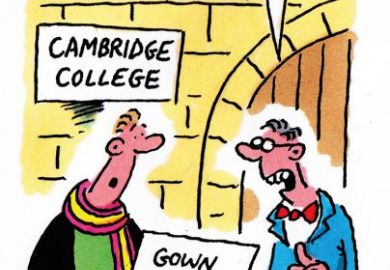
Asking students to use proper grammar perpetuates racism and “unjust language structures”, US academics have claimed. New guidance from the University of Washington-Tacoma Campus’ Writing Center states that “there is no inherent ‘standard’ of English” as “language is constantly changing”, which meant that lecturers should be “sensitive to our language practices…that may make some people feel uncomfortable or feel in some way inferior,” The Washington Times reported on 21 February. “While overt racism is usually easily identified, more elusive are micro-aggressions, forms of degradation which manifest on a subconscious and casual level,” added the centre’s “anti-racism and social justice statement”, which was described by one UW Tacoma leader as “a great example of how we are striving to act against racism”. With US president Donald Trump already using his own idiosyncratic and often perplexing version of the English language, often to great effect, who will be next in America to discard the traditional orthodoxies of syntax and grammar?
The practice of asking individuals to “check their privilege” has been taken to a new level by an Australian university, the Daily Mail reported on 24 February. New students at the University of Western Australia, in Perth, have been handed a 29-point “male privilege” checklist as part of “diversity dialogue” workshops during orientation week, the Mail said. Among the iniquitous “privileges” enjoyed by men, according to the checklist, are that the “odds of being hired for a job, when competing against female applicants, are probably skewed in my favour” and that male “clothing is typically less expensive and better-constructed”. Promiscuous men are less likely to be called a “slut” than women, while men are interrupted less and also under less pressure to be thin, the list suggested. UWA also has a separate 20-point checklist for “white privilege” and another on “heterosexual privilege”, which are designed to be “discussion points” rather than reflect the views of any staff or students, the university said.
Everton Football Club has made their most unusual signing of the season – a 63-year-old university professor, the Liverpool Echo reported on 15 February. As part of a five-year partnership between the Premier League club and Liverpool Hope University, Ian Vandewalle, pro vice-chancellor for operations, has become the new Everton chair in social responsibility, the paper said. Professor Vandewalle, who established Liverpool Hope’s business school in 2000, will lead academic research into the Toffees’ community work and its impact on education, health and business in Liverpool. If the learned professor’s work on the Goodison Park club proves successful, might it also ask him to find a solution to the club’s traditional mid-season slump in form?
A second UK university has cancelled an Israel Apartheid Week event just days after official government advice was issued on the annual series of lectures and rallies. University College London claimed that the Friends of Palestine Society had “not followed procedure” when organising a talk, titled “Quad Under Occupation”, which had invited attendees to “explore the practices which sow the seeds of racial tension in Israel”, Jewish News reported on 23 February. Its decision to withhold permission for the event follows the University of Central Lancashire's move to block all events linked to Israel Apartheid Week, which takes place in March each year. The cancellations were made shortly after the release of a letter to Universities UK from universities minister Jo Johnson, sent on 13 February, that reminded institutions that events held “under the banner of ‘Israel Apartheid’…need to be properly handled” in light of “rising reports of anti-Semitic incidents in this country”.
A “exceptionally able” Bangor University student was facing deportation three months before she is due to graduate, BBC News Online reported on 25 February. Shiromini Satkunarajah, who was born in Sri Lanka but has lived in the UK for eight years, was set to graduate with a first-class honours degree in electrical engineering this summer after averaging almost 90 per cent in her final-year exams so far. However, she was detained with her mother after they were refused asylum, the BBC said. A ticket back to Sri Lanka had been booked for the pair, the 20-year-old student said. More than 23,000 people signed a petition against Ms Satkunarajah’s treatment, which was described as “heartless…unjust and unfair” by local Arfon MP Hywel Williams. A Home Office spokesperson said that the “UK has a proud history of granting asylum to those who genuinely need it, and every case is carefully considered on its individual merits”.
Register to continue
Why register?
- Registration is free and only takes a moment
- Once registered, you can read 3 articles a month
- Sign up for our newsletter
Subscribe
Or subscribe for unlimited access to:
- Unlimited access to news, views, insights & reviews
- Digital editions
- Digital access to THE’s university and college rankings analysis
Already registered or a current subscriber?

